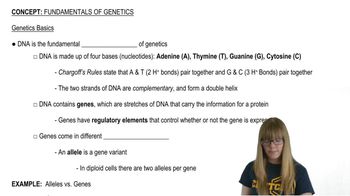A victim of murder is found to have scrapings containing skin cells under several of her fingernails. Genetic analysis confirms that the DNA isolated from these cells came from the same individual and does not match the DNA of the victim. The results shown below are for six CODIS STR markers from the crime scene DNA (from under the victim's fingernails and presumed to be the murderer's), and from three suspects (A, B, and C) who have been detained for questioning about the murder. Do the STR results exclude any of the three suspects? Explain.
Table of contents
- 1. Introduction to Genetics51m
- 2. Mendel's Laws of Inheritance3h 37m
- 3. Extensions to Mendelian Inheritance2h 41m
- 4. Genetic Mapping and Linkage2h 28m
- 5. Genetics of Bacteria and Viruses1h 21m
- 6. Chromosomal Variation1h 48m
- 7. DNA and Chromosome Structure56m
- 8. DNA Replication1h 10m
- 9. Mitosis and Meiosis1h 34m
- 10. Transcription1h 0m
- 11. Translation58m
- 12. Gene Regulation in Prokaryotes1h 19m
- 13. Gene Regulation in Eukaryotes44m
- 14. Genetic Control of Development44m
- 15. Genomes and Genomics1h 50m
- 16. Transposable Elements47m
- 17. Mutation, Repair, and Recombination1h 6m
- 18. Molecular Genetic Tools19m
- 19. Cancer Genetics29m
- 20. Quantitative Genetics1h 26m
- 21. Population Genetics50m
- 22. Evolutionary Genetics29m
18. Molecular Genetic Tools
Methods for Analyzing DNA
Problem 7
Textbook Question
As genetic testing becomes widespread, medical records will contain the results of such testing. Who should have access to this information? Should employers, potential employers, or insurance companies be allowed to have this information? Would you favor or oppose having the government establish and maintain a central database containing the results of individuals' genome scans?
 Verified step by step guidance
Verified step by step guidance1
Understand the ethical and privacy concerns associated with genetic testing results. Genetic information is sensitive and can reveal predispositions to diseases, traits, and other personal data.
Consider the implications of allowing access to genetic information for employers or insurance companies. Discuss how this could lead to discrimination, such as hiring biases or denial of coverage based on genetic predispositions.
Evaluate the pros and cons of a government-maintained central database for genome scans. Consider issues like data security, misuse of information, and potential benefits for public health research and disease prevention.
Explore existing laws and regulations, such as the Genetic Information Nondiscrimination Act (GINA), which protects individuals from genetic discrimination in employment and health insurance in the United States.
Formulate a position based on ethical principles, societal impact, and legal frameworks. Consider advocating for strict privacy protections and limited access to genetic information to prevent misuse while enabling beneficial uses like medical research.
 Verified video answer for a similar problem:
Verified video answer for a similar problem:This video solution was recommended by our tutors as helpful for the problem above
Video duration:
1mPlay a video:
Was this helpful?
Key Concepts
Here are the essential concepts you must grasp in order to answer the question correctly.
Genetic Privacy
Genetic privacy refers to the right of individuals to control access to their genetic information. As genetic testing becomes more common, concerns arise about who can access this sensitive data, including employers and insurance companies. Protecting genetic privacy is crucial to prevent discrimination and ensure that individuals are not unfairly treated based on their genetic predispositions.
Recommended video:
Guided course

Descriptive Genetics
Ethical Implications of Genetic Testing
The ethical implications of genetic testing involve the moral considerations surrounding the use and potential misuse of genetic information. This includes issues of consent, the potential for discrimination, and the responsibilities of those who hold genetic data. Understanding these implications is essential for navigating the debate on access to genetic information.
Recommended video:
Guided course

History of Genetics
Regulatory Frameworks for Genetic Data
Regulatory frameworks for genetic data encompass the laws and guidelines that govern the collection, storage, and sharing of genetic information. These regulations aim to protect individuals' rights while balancing the interests of public health and research. Familiarity with these frameworks is necessary to evaluate proposals for government databases and the role of various stakeholders in managing genetic data.
Recommended video:
Guided course

Genetics Basics

 7:40m
7:40mWatch next
Master Methods for Analyzing DNA and RNA with a bite sized video explanation from Kylia
Start learningRelated Videos
Related Practice
Textbook Question
352
views
